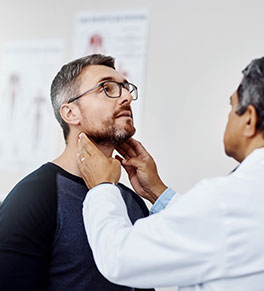Thyroid Cancer
While most thyroid nodules are benign, approximately 5 percent of them are cancerous.
Relative to other cancers, thyroid cancers are rare. They account for 1.5 percent of cancers in adults, and 3 percent in children.
Symptoms
In its earliest stages, thyroid cancer usually doesn't cause any symptoms. As it grows, however, it may cause:
- A lump that can be felt
- Voice changes
- Swallowing difficulty
- Swollen neck lymph nodes
Types
Our expert thyroid surgeons can treat all cancers of the thyroid, including:
If you have a mass on your neck that you can see or feel, call our specialists for an evaluation at 714-456-7017 or request an appointment online.








